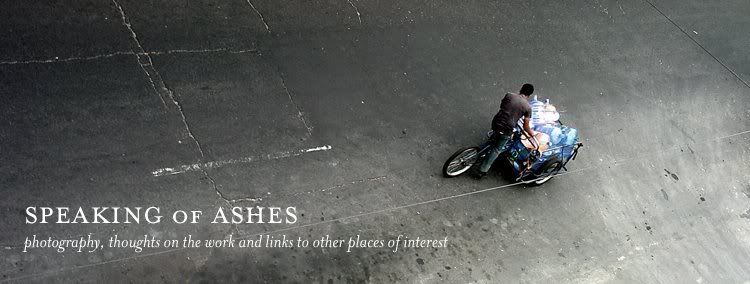our eyes are not pro-active
 I think pretty seriously that this fleshed out comment-cum-blogpost at Nonprophet art deserves a bit more attention. Here's what Geoffrey said:
I think pretty seriously that this fleshed out comment-cum-blogpost at Nonprophet art deserves a bit more attention. Here's what Geoffrey said:
What just popped in my head was the day i finally understood that our eyes aren't proactive. Our vision doesn't move out like tentacles and actually gather information. Instead we eat what little we are given through a slot under the door (again with the crack in the wall) as our eyes process light that enters them. and we learn that the different combinations of light is a this or a that. And we separate those this' and thats' and put them in a logical order, as bohm says, intitially, so that we can deal with them easier. Until our logic becomes so smug that it believes it can take it from here, and begins to tell our eyes what is and what is not. Our expericence becomes based on what we now think we see which forms our perceptions which eventually... yes... allows us to see only what we want to see. (and you can rearrange all that in whatever order you wish.)
Ok. Is that just too difficult for the CAA to comprehend? That smugness has become the raison d'etre of the whole art making machine, and it is based completely on the inability to see. Noticing the edge of your model's arm, and how that contrasts with whatever happens to be behind it, is not like first year drawing class stuff.
When I suffered the realization that Geoffrey describes above, I realized also that when one understands the glint on an eyeball, and that one has been missing that and a thousand other contrasts and pure, simple, characteristics, then one is facing the very means by which people are imprisoned in language games and meaningless gestures and lives. It is cleverness at language that allows us to bypass nuance and resonance. It is our clever reading of history's failures that allows us to make the same mistakes without appreciating that the splash of blood on stones sounds exactly the same now as it always did.
Just as capitalism is understood to be the answer to everyone's prayers, despite its disastrous effects on mankind, we are continually told that the problem of light falling on a naked body was solved a long time ago. In fact, it is just as problematic as ever and even more so a problem than private arms producers controlling the US government. We could (and should) imprison all of them, but we still can't see the naked body. Can't you just see those tenured MFA department chairs just insisting that they can see eeeeeeeeeeeeverything?
We can pretend all we want that what we are doing is seeing, gazing, gaping, oggling, leering, but we are left, of course, at the limit of understanding the moment we realize that we have chosen to see mostly the pussy and the boobs, those things to which we are particularly blind. That's why art people call it "reading," thus suggesting some common public will "read" the work. And of course that is precisely why we, those of us not looking for the television read on life, seldom tire of looking. And what simply makes it such a severe problem is that we know we have the capability of seeing, and yet we leave this faculty to be described by morons, Patrick Nagels with machine guns.
The point I think Geoffrey's post leads nicely to is that people, artists, whoever, who can see, who understand the limits of seeing, are less apt to be tearing other people apart. You can tear arguments apart. But it is much more difficult to tear apart someone who has discovered that light creeping around a branch or an arm is not the same as light coming out of a television. The light cascading from from a branch in the forest might finally be seen. The object of desire might be experienced, even indirectly, at last through someone else's eyes if not through our own. That's why I find it so easy to work with artists who understand this even when I can barely stand them personally. We get drunk and fight later about some stupid language issue, but we spend all day anticipating that one precious glimpse and providing them to one another.
This seems to me to lend a moral imperative to good painting.


Suprise! I'm back.
ReplyDeleteI can't believe you got no comments on this one. It's so interesting to me. These issues of seeing have been in my atmosphere a lot lately. One of the concepts that arises in yoga is this: that the mind/memory/attachments/aversions serve as a uniquely colored filter... through which we perceive the world around us, as well as the world inside us. As the filter is cleared, the honesty and accuracy of our self awareness grows - and then the honesty and accuracy of the world around us also grows. So, learning to see inwardly and externally accomplish dual goals of bringing us into closer contact with ourselves and our fellowship of "others."
Also, a side note on the eyes.... something in the quote from Geoffrey got me thinking. In yoga practice, I often find my eyeballs wandering all over the place - and pulling my thoughts along with them. I asked my teacher for any thoughts on the matter, and he suggested that I remember that the energetic home of the eyes is the stomach. And to think of receiving (absorption) via the eyes rather that "seeing" (projecting) via the eyes. The stomach bit still eludes me, but that second part has been quite interesting and useful.
This post made me miss sitting with you and chatting. :)